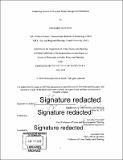Enhancing trust in US nuclear waste management institutions
Author(s)
Smith, Christopher David, Ph. D. Massachusetts Institute of Technology
DownloadFull printable version (24.40Mb)
Alternative title
Enhancing trust in United States nuclear waste management institutions
Other Contributors
Massachusetts Institute of Technology. Department of Urban Studies and Planning.
Advisor
Lawrence Susskind.
Terms of use
Metadata
Show full item recordAbstract
The failure of US policymakers to develop a permanent geological disposal solution has led to the accumulation of spent nuclear fuel and high-level radioactive waste material at nuclear power plants and former weapons manufacturing facilities. This situation poses a growing long-term public safety hazard, and it hampers the possibility of a revival of commercial nuclear power generation for electricity decarbonization. Policymakers have struggled to resolve the nuclear waste management problem in the face of determined opposition from state governments and some host communities. At present we have a policy process stalemate. A key factor contributing to the stalemate has been a deficiency of public trust in nuclear waste management institutions. I argue that nuclear waste management institutions, such as the Department of Energy, have inspired distrust as a result of behavior that has undermined public perceptions of their trustworthiness, including their competence and fairness. In exploring parallel policy system cases involving high levels of complexity, uncertainty, and risk, I find that strong consent regimes produce three approaches to achieving public consent: coercion, cooperation, and concession. Policy systems with relatively weak consent regimes allow governance institutions to exercise greater autonomy but at risk of losing legitimacy. I argue that the cooperation approach is the best fit for pursuing public consent for high-level nuclear waste policies, and that institutional trust makes the cooperation approach more effective. I propose the adoption of a national "trust strategy" to enhance trust in nuclear waste management institutions by demonstrating and promoting institutional trustworthiness. Repairing damaged trust will be as important a strategic objective as building new levels of trust.
Description
Thesis: Ph. D. in Public Policy and Planning, Massachusetts Institute of Technology, Department of Urban Studies and Planning, 2018. Cataloged from PDF version of thesis. Includes bibliographical references (pages 353-399).
Date issued
2018Department
Massachusetts Institute of Technology. Department of Urban Studies and PlanningPublisher
Massachusetts Institute of Technology
Keywords
Urban Studies and Planning.